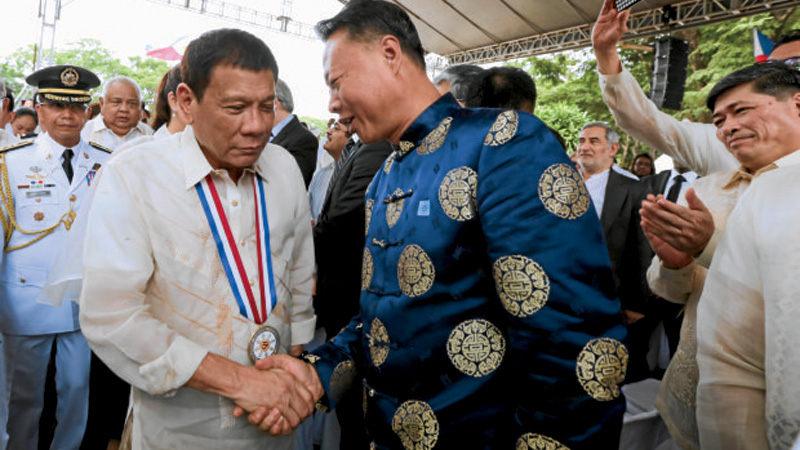PH foreign policy to benefit China–BMI Research

President Rodrigo R. Duterte shakes hands with Chinese Ambassador to the Philippines Zhao Jianhua KING RODRIGUEZ/PPD/FILE PHOTO
THE “INDEPENDENT” foreign policy of the Duterte administration should not be belittled, as it could significantly undercut the influence of the United States, a longtime ally and global superpower, in the region, according to the research arm of Fitch Group.
“Philippine President Rodrigo Duterte’s apparent foreign policy shift away from the US toward China could substantially undermine Washington’s geopolitical influence in Asia at a time when tensions between Beijing and its neighbors are rising,” Fitch Group’s BMI Research said in a Sept. 30 report titled, “Duterte’s foreign policy shift to undermine US’ geopolitical influence.”
“As a result, the US and Japan will increasingly attempt to cultivate Vietnam as a regional security partner in the South China Sea,” the report said.
The “rebalancing”—as described by members of Mr. Duterte’s Cabinet—of Philippine foreign policy is seen to benefit China.
“A major geopolitical shift in Asia appears to have begun in mid-2016, when Rodrigo Duterte became President of the Philippines, and this will undermine the US position to the benefit of China,” BMI Research said.
It noted that Mr. Duterte’s predecessor, Benigno Aquino III, “pursued a staunchly anti-China policy, as Beijing adopted an increasingly assertive stance toward its claims to the South China Sea.”
“Aquino bolstered the Philippines’ ties with the US and Japan, both of which are wary of China’s growing military power in Asia,” BMI Research further noted.
Accommodating China
In contrast, Mr. Duterte “has adopted a noticeably anti-American tone, while sounding more accommodating toward China.”
“This suggests that the Philippines’ presence in an informal US-led bloc of Asian nations aimed at counter-balancing China’s rise is no longer assured,” BMI Research said.
The report noted that because of its strategic location between global trade routes connecting the Pacific Ocean and the West Philippine Sea, the Philippines had gained geopolitical importance.
“The US first recognized the Philippines’ strategic significance more than a century ago, when it seized the territory from Spain in the Spanish-American War of 1898,” it said.
Even after ending its rule over the Philippines when granted independence in 1946, the United States kept close ties with Manila, it added.
The latest manifestation of close Philippine-US relations was in 2014, when Aquino signed a 10-year Enhanced Defense Cooperation Agreement with Washington, it noted.
Tribunal ruling
When the Hague-based Permanent Court of Arbitration ruled last July that China’s historical claim over more than four-fifths of the West Philippine Sea was invalid, “Beijing immediately rejected the ruling, regarding the court as being biased,” BMI Research pointed out.
“China will most likely continue to consolidate its position in the South China Sea through the construction of artificial islands capable of housing military facilities, and most probably by declaring an Air Defense Identification Zone over the sea in the near future,” it added.
BMI Research said that “in contemporary Asian geopolitics, China regards the Philippines as a key element of the so-called ‘first island chain’ running from southern Japan and Taiwan down to the South China Sea, which the US formulated in the Cold War to contain the USSR and China.”
“Therefore, if the Philippines were to abandon the US-led network of alliances, it would be a severe blow to Washington’s ‘first-island-chain’ strategy,” it said.
“Even if the Philippines merely adopted a more neutral position, this would work to China’s advantage,” it added.
‘Volatile personality’
As for Mr. Duterte, BMI Research said his “volatile personality portends geopolitical confusion.”
He “has generated international headlines since September 2016 by publicly cursing the US and EU, which criticized his antidrug campaign for the estimated 3,000 deaths that it has caused. Duterte regards such criticism as infringements on Philippine sovereignty and has increasingly emphasized that he will pursue an ‘independent foreign policy’ that would entail warmer relations with China, and possibly Russia, too,” the report noted.
Unclear policy
But for BMI Research, the President’s long-term foreign policy plans “remain unclear.”
“He is one of several populist leaders who have enjoyed a meteoric rise in 2016, and is not a member of the Philippines’ traditional US-aligned elite. As such, it is unsurprising that he has a worldview different from his predecessors,” it said.
“In addition, as a former mayor of Davao, Duterte lacks international experience, and could eventually find that his nationalist rhetoric is difficult to implement. Duterte also has a reputation for making bold or controversial statements, only for him or another senior official to backtrack somewhat afterwards, raising question marks about his true intentions,” it added.
As such, “Duterte’s apparent volatility carries political risks,” BMI Research said.
